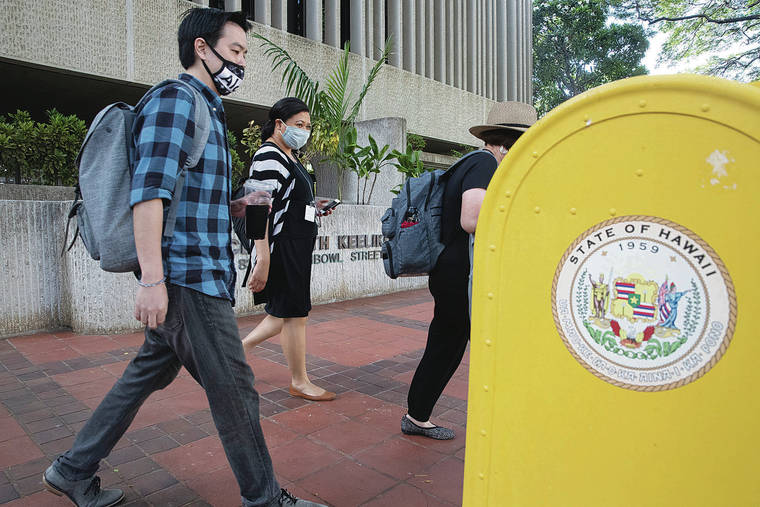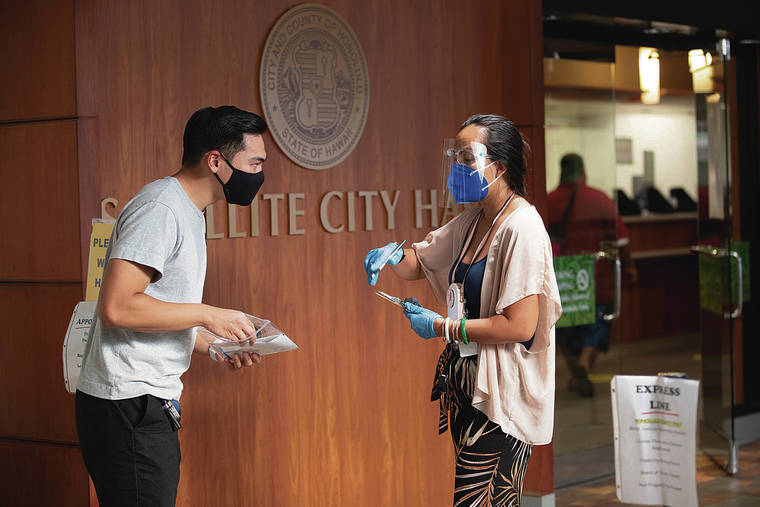Hawaii state and county workers not vaccinated against COVID-19 must undergo weekly testing


GEORGE F. LEE / GLEE@STARADVERTISER.COM
Gov. David Ige announced a vaccine mandate for state and county workers at a news conference Thursday. Above, state workers departed the Princess Ruth Keelikolani Building at the end of the day Thursday.

GEORGE F. LEE / GLEE@STARADVERTISER.COM
Above, city worker Angyl Medeiros, right, helped a customer at the Ala Moana Satellite City Hall.



State and county employees will be required to show proof that they are vaccinated against COVID-19 by Aug. 16 or undergo weekly testing under new emergency rules announced Thursday by Gov. David Ige in response to a sharp rise in coronavirus cases.
Employees are expected to be able to request exemptions from the vaccine requirements for medical or religious reasons, but the details of how to apply for such waivers are still being worked out and will depend on the employer, said Ige. He made clear that workers risk being fired if they refuse to comply with the requirements.
“Today the number of cases and hospitalizations are all trending up — dramatically,” Ige said during a news conference. “The highly contagious delta variant creates a big risk of infection, especially for members of our community who are not vaccinated. Based on the current conditions, I must take action to protect public health and avert unmanageable strains on our health care all across the state.”
Ige said unvaccinated workers must pay for tests if they don’t use a free testing site, and may be subject to work-related travel restrictions.
The vaccine requirements apply to tens of thousands of state and county employees, including office workers throughout dozens of departments, police, firefighters, teachers, professors and staff of the University of Hawaii and guards throughout the state’s correctional system.
The vaccine requirements signify a major shift in the state’s fight against the coronavirus as cases surge to their highest level since the start of the pandemic and some lose patience with vaccine holdouts.
Don't miss out on what's happening!
Stay in touch with breaking news, as it happens, conveniently in your email inbox. It's FREE!
“We want to return to our fields and gyms, to get kids back in classrooms without distractions and masks, to allow folks to see our smiles again,” said Hawaii island Mayor Mitch Roth, who was among the county mayors present at the news conference to lend support to the governor’s decision. “It’s been over a year since we have been able to hold baby luaus and large weddings. Enough is a enough already.”
The governor does not have authority over the legislative and judiciary branches of government. But on Thursday, Hawaii Supreme Court Chief Justice Mark E. Recktenwald issued a statement saying that the courts would soon follow suit. The state House of Representatives also announced that all of its members and staff must be fully vaccinated against COVID-19 by Sept. 30 or undergo weekly testing, and the Senate plans to discuss a similar mandate early next week.
Earlier this week Hawaii Pacific Health, Kaiser Permanente, The Queen’s Health Systems and Adventist Health Castle announced that they are requiring employees to get vaccinated by the start of October. Additional hospitals and health care providers are expected to follow.
State health officials for months now have implored residents to get vaccinated, if not for themselves, for the health and safety of the larger community. They’ve even offered incentives, such as a year’s worth of free meals at Zippy’s, free stays at local resorts and cash prizes through a statewide sweepstakes. But the state’s pace of vaccination has continued to sputter.
There are now 60.5% of Hawaii residents fully vaccinated and 67.6% who have received at least one shot, according to the latest state data. But as the delta variant has taken hold in recent weeks, the virus has been sweeping through pockets of the unvaccinated population, creating more pressure to mandate vaccines in both the public and private sectors.
In the past month the number of people in the hospital with COVID-19 has quadrupled to more than 160. Approximately 95% of those hospitalized with COVID-19 are unvaccinated, according to the state Department of Health.
Ige said Thursday that a prior plan to drop all pandemic-related restrictions on activities and businesses once 70% of the population was fully vaccinated might now have to be reevaluated. The highly transmissible nature of the delta variant has upped the percentage of the population that likely needs to be vaccinated in order to largely curtail the spread of the virus.
Ige’s new vaccine and testing requirements are already eliciting criticism from some lawmakers and public-sector unions.
State Rep. Val Okimoto (R, Mililani-Mililani Mauka- Waipio Acres) said she encouraged everyone to get vaccinated but didn’t support mandates. In a letter to Ige, she said a common reason why people don’t get the vaccine is distrust in government and institutions, which can’t be fixed by “forcing and shaming our residents against their will.”
“I can think of nothing more threatening to individual freedoms, personal choice, and well-being than holding people’s careers hostage by mandating the vaccine,” wrote Okimoto.
Union leaders quickly panned the governor’s announcement but stopped short of saying that they opposed vaccination and testing requirements or would seek to mount a legal challenge. Their criticism centered largely on what they said was a shoddy rollout of an unformulated policy and being shut out of negotiations.
“The fact that they don’t have details worked out, details are forthcoming, they don’t have a plan — this is typical of this administration,” said Randy Perreira, executive director of the Hawaii Government Employees Association, the largest of Hawaii’s public-worker unions with nearly 41,000 members. “They grandstand with an announcement, but they don’t have meat on the bones.”
Osa Tui Jr., president of the Hawaii State Teachers Association, said that he was concerned that teachers, who are already in short supply, would leave their jobs and that employees who opt to comply with regular testing could end up having to pay the costs, particularly in rural areas of the state where access to free tests may not be available.



